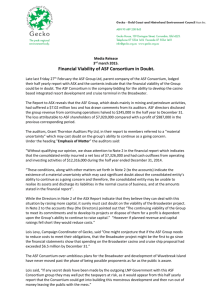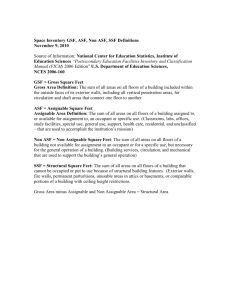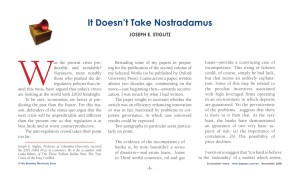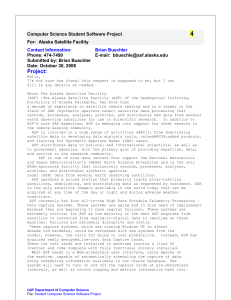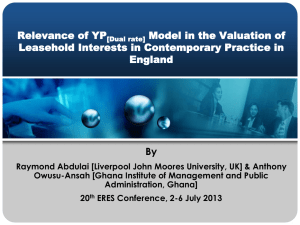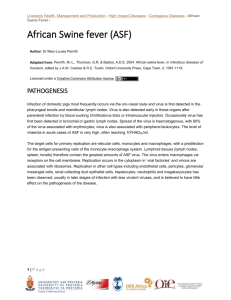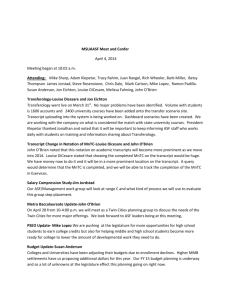August 24, 2012 Thomas J. Butler, Director, Office of Credit Ratings
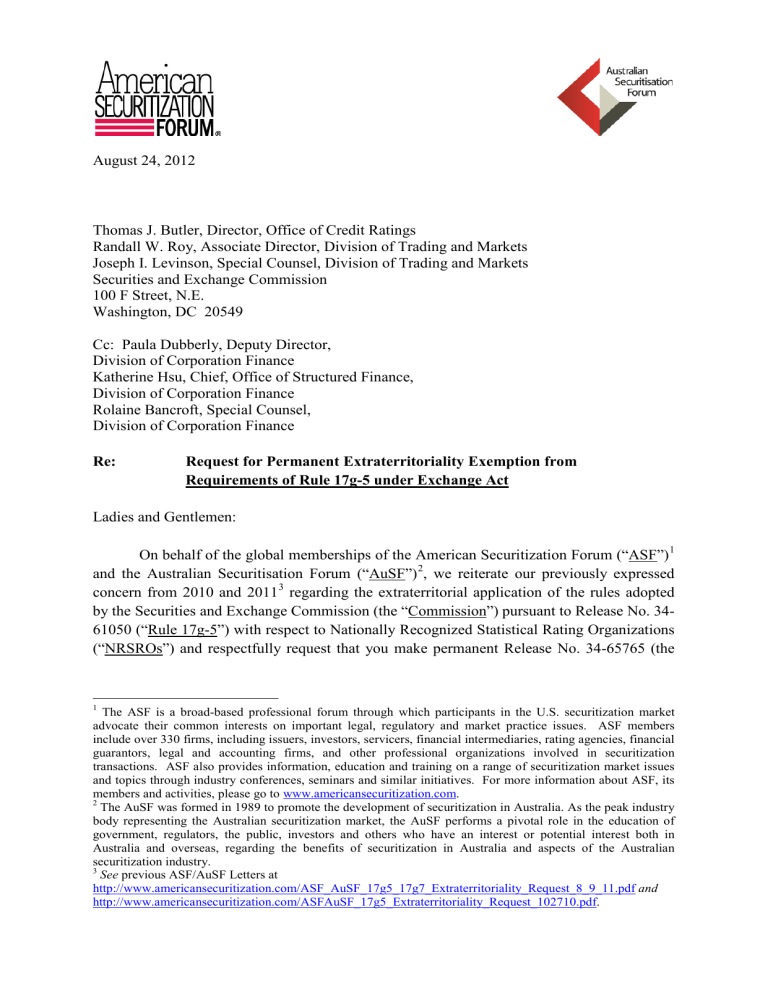
August 24, 2012
Thomas J. Butler, Director, Office of Credit Ratings
Randall W. Roy, Associate Director, Division of Trading and Markets
Joseph I. Levinson, Special Counsel, Division of Trading and Markets
Securities and Exchange Commission
100 F Street, N.E.
Washington, DC 20549
Cc: Paula Dubberly, Deputy Director,
Division of Corporation Finance
Katherine Hsu, Chief, Office of Structured Finance,
Division of Corporation Finance
Rolaine Bancroft, Special Counsel,
Division of Corporation Finance
Re: Request for Permanent Extraterritoriality Exemption from
Requirements of Rule 17g-5 under Exchange Act
Ladies and Gentlemen:
On behalf of the global memberships of the American Securitization Forum (“ASF”)
and the Australian Securitisation Forum (“AuSF”)
, we reiterate our previously expressed concern from 2010 and 2011
regarding the extraterritorial application of the rules adopted by the Securities and Exchange Commission (the “Commission”) pursuant to Release No. 34-
61050 (“Rule 17g-5”) with respect to Nationally Recognized Statistical Rating Organizations
(“NRSROs”) and respectfully request that you make permanent Release No. 34-65765 (the
1
The ASF is a broad-based professional forum through which participants in the U.S. securitization market advocate their common interests on important legal, regulatory and market practice issues. ASF members include over 330 firms, including issuers, investors, servicers, financial intermediaries, rating agencies, financial guarantors, legal and accounting firms, and other professional organizations involved in securitization transactions. ASF also provides information, education and training on a range of securitization market issues and topics through industry conferences, seminars and similar initiatives. For more information about ASF, its members and activities, please go to www.americansecuritization.com
.
2
The AuSF was formed in 1989 to promote the development of securitization in Australia. As the peak industry body representing the Australian securitization market, the AuSF performs a pivotal role in the education of government, regulators, the public, investors and others who have an interest or potential interest both in
Australia and overseas, regarding the benefits of securitization in Australia and aspects of the Australian securitization industry.
3
See previous ASF/AuSF Letters at http://www.americansecuritization.com/ASF_AuSF_17g5_17g7_Extraterritoriality_Request_8_9_11.pdf
and http://www.americansecuritization.com/ASFAuSF_17g5_Extraterritoriality_Request_102710.pdf
.
ASF/AuSF Rule 17g-5 Extraterritoriality Exemption Request
August 24, 2012
Page 2
“Order Extending Temporary Conditional Exemption”),
which is set to expire on December
2, 2012.
Rule 17g-5 applies U.S.-based securities regulations to asset-backed securities
(“ABS”) transactions entirely bought and sold overseas with only the Commission’s regulation of NRSROs as the jurisdictional nexus. Imposition of Rule 17g-5 on transactions offered by foreign issuers solely to foreign investors would have an undue negative impact on global issuance of ABS and exact extensive costs on securitization issuers and NRSROs around the globe without tangible benefits to, or protection of, U.S. investors.
I.
Existing Rule 17g-5 has Proven to be Ineffective in the United States
From the industry’s perspective there has been, to date, no material progress in the
U.S. towards achieving the stated goals of the Commission since the June 2, 2010 compliance date of Rule 17g-5. Longstanding discussions among our issuer member firms have produced credible and specific evidence that very few non-hired NRSROs have requested access to the websites that arrangers are required to maintain under the Rule. Despite this fact, arrangers of ABS continue to be burdened by tens of millions of dollars in initial and ongoing compliance costs in connection with the Rule, at a time when restarting the securitization markets in the U.S. and around the globe is still a critical component of economic recovery.
Although it has been largely ineffective to date, we fully support, in the context of the
U.S. market, the Commission’s interrelated goals as stated in the Rule 17g-5 Adopting
Release,
namely, to promote increased competition among NRSROs through issuance of unsolicited ratings, to address conflicts of interest in credit ratings and, ultimately, to improve ratings quality.
To that end, we believe that material enhancements to Rule 17g-5 may help the Rule better achieve its goals, including, among other things, increased transparency to investors and lower barriers to access arranger websites for non-hired NRSROs. ASF included these proposals, as well as additional detail, in the September 12, 2011 letter
responding to the Commission’s “Solicitation of Comment to Assist in Study on Assigned
Credit Ratings” pursuant to Section 939F of the Dodd-Frank Act (the “Franken
Amendment”).
Finally, as discussed extensively in our letter, ASF believes that the mechanism for selecting rating agencies contained in the Franken Amendment, if adopted, would exact even more costs on the market and potentially cause new conflicts of interest within the securitization market, without corresponding benefits.
4
See http://www.sec.gov/rules/other/2011/34-65765.pdf
.
5
See Rule 17g-5 Adopting Release at 63844.
6
See http://www.americansecuritization.com/ASF_DOL_Letter_re_Ratings_Competition_9_29_11.pdf
.
7
See http://www.americansecuritization.com/ASF_Letter_to_SEC_re_Franken_Amendment_(9-12-11).pdf
.
8
See http://www.gpo.gov/fdsys/pkg/FR-2011-05-16/pdf/2011-11877.pdf
.
ASF/AuSF Rule 17g-5 Extraterritoriality Exemption Request
August 24, 2012
Page 3
II.
Rule 17g-5 Raises Substantial Jurisdictional Concerns
Concerns with respect to the effectiveness of Rule 17g-5 are compounded by lingering international uncertainty regarding its potential future applicability to extraterritorial transactions. Our members believe that the Rule should not apply to the conduct of NRSROs or arrangers with respect to non-U.S. offerings, absent a substantial effect in the U.S. or on U.S. persons. We believe that defining the scope of the Rule in this way would advance the Commission’s objectives, provide sufficient certainty for market participants and regulators in other jurisdictions, and avoid certain unintended consequences that might otherwise arise in the context of rated deals involving non-U.S. arrangers selling to non-U.S. investors.
In common with the laws of other Organisation for Economic Cooperation and
Development (“OECD”) jurisdictions, the federal securities laws of the U.S. focus on the regulation of offerings to U.S. persons or with substantial impact on the U.S. This guiding principle of local investor protection is reflected in the preamble to, and the findings set out at the start of, the U.S. Credit Rating Reform Act of 2006 and in the general mandate of the
Commission itself. This principle suggests the Commission has a limited interest in regulating securities offered solely outside the U.S. and this is evidenced by certain existing provisions and practices, including the Regulation S safe harbor . Given this background, the application of Rule 17g-5 to all credit ratings provided by an NRSRO or a registered affiliate, regardless of whether the relevant transaction involves a U.S. investor connection (i.e., via a
U.S. issuer or a U.S. offering), would be inconsistent from a policy perspective with the wider U.S. legislative and regulatory framework as well as principles of international comity.
Additionally, with respect to Rule 17g-5, while each NRSRO defines the parts of its business that operate under the NRSRO designation (and, in theory, can therefore control the scope of its conduct that is subject to the Rule), arrangers have no role in the NRSROdesignation process but incur significant burdens by operation of Rule 17g-5 simply because they engage the NRSRO to assign an initial credit rating. Because the Rule operates to regulate the conduct of both NRSROs and arrangers, under general principles of fairness, the
Rule should not apply to conduct outside the U.S. by non-U.S. issuers absent a substantial effect in the U.S. or on U.S. persons.
ASF/AuSF Rule 17g-5 Extraterritoriality Exemption Request
August 24, 2012
Page 4
III.
Conclusion
We encourage the Commission to make permanent its exemption for NRSROs outside the U.S. from the requirements of the Rule absent a substantial effect in the U.S. or on U.S. persons. Although our organizations are supportive of the general goals of Rule
17g-5, we encourage the Commission to reevaluate the considerable costs of these amendments relative to their actual benefits with respect to local investor protection. Since the financial crisis, securitization markets worldwide have been gradually recovering. These markets would benefit greatly from the removal of remaining uncertainties and impediments so that securitization might continue to provide a beneficial role in financing international economies in the future. Please do not hesitate to contact Tom Deutsch, ASF Executive
Director, at 212.412.7107 or at tdeutsch@americansecuritization.com
or Chris Dalton, AuSF
CEO, at +61.2.8243.3906 or at cdalton@securitisation.com.au
with any questions.
Sincerely,
Tom Deutsch
Executive Director
American Securitization Forum
Chris Dalton
Chief Executive Officer
Australian Securitisation Forum
